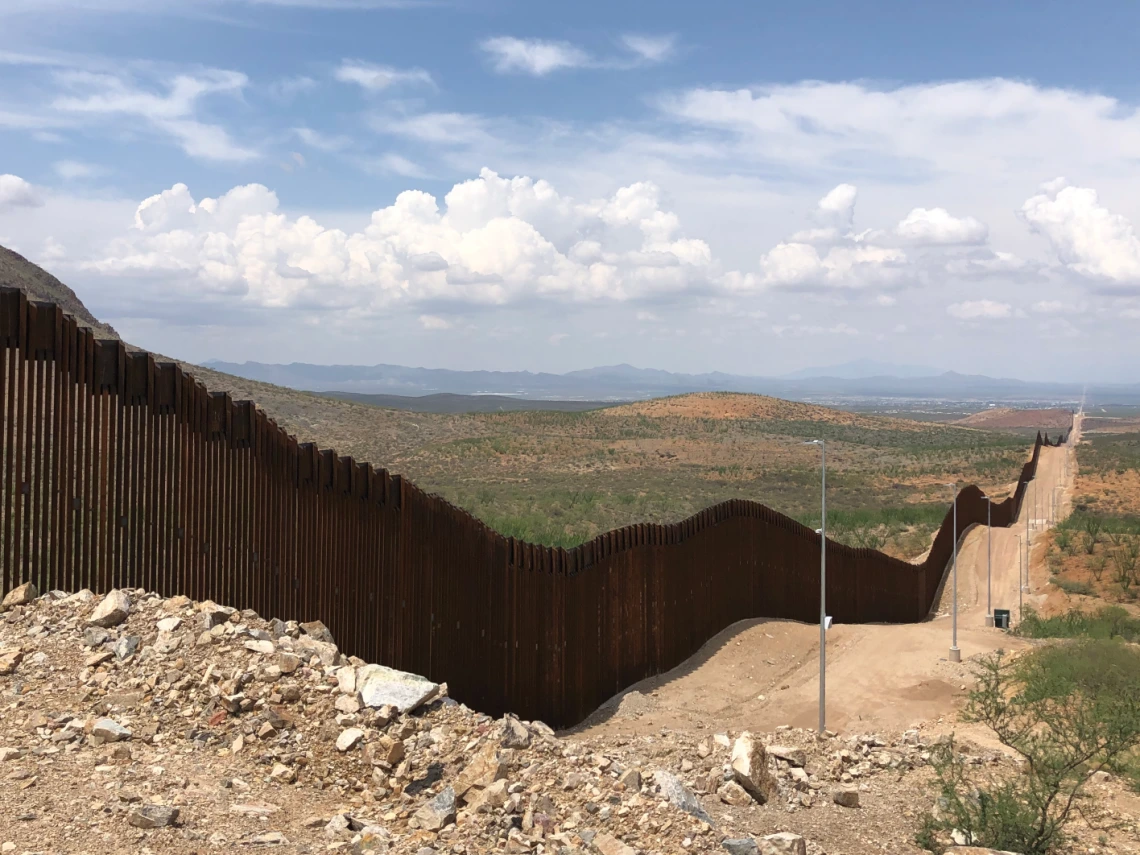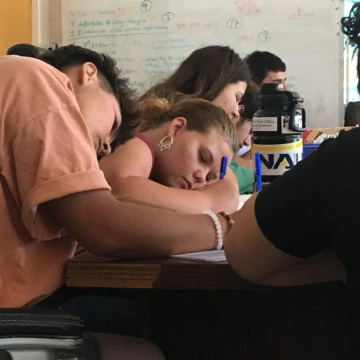Writing the Border
With a seed gift from Nancy Kelly, graduate students in the Southwest Field Studies in Writing Program bridge community engagement and writing – and advance the conversation on environmental and social justice issues on the border.

The U.S.-Mexico border wall
Francisco Cantú
“Words, arranged just so, create movements and bend society towards justice,” wrote Logan Philips while he was a Fellow in the Southwest Field Studies in Writing Program, or SFSW.
Each summer, the SFSW Program sends three to four University of Arizona Creative Writing MFA student Fellows to research and write on social justice and environmental challenges unique to the U.S.-Mexico border during a two-week residency in Patagonia, Ariz. These students also lead storytelling workshops and engage in hands-on environmental restoration projects with 10-15 high school students from underserved border communities, in collaboration with the Borderlands Restoration Network’s Borderlands Earth Care Youth Program.
The SFSW Program, housed in the Department of English, is led by two award-winning writers: English Professor Susan Briante, author most recently of Defacing the Monument, and English lecturer and MFA alumnus Francisco Cantú, author of The Line Becomes a River: Dispatches from the Border.
The SFSW Program launched in 2017 as a companion program to the Field Studies in Writing Program in the Canadian Maritimes, founded by Regents Emerita Professor Alison Hawthorne Deming. The program has received support from the Agnese Nelms Haury Program in Environment and Social Justice and the Arizona Institutes for Resilience.
Recently, Nancy Kelly donated to fund the program for three years. She hopes her gift will inspire other donations that can ensure the long-term sustainability of this unique program.
Reciprocal Learning
The SFSW residency includes various hands-on activities: The Fellows have met with groups addressing overgrazing, served food to deported migrants, refilled water tanks for migrants lost in the desert, visited ecosystems destroyed to make way for border wall construction, among other activities.
“We are blessed as writers to have the internet at our fingertips to pull up facts and figures,” Briante said. “But there's nothing that beats being there.”
Being immersed in the border is an essential part of the program, certainly. But what makes the program special are the community partnerships and what Briante and Cantú call “reciprocal learning.”
“There is a long-standing model where writers and journalists parachute into a community to write about an issue without really engaging or reciprocating,” Cantú said. “But with this program, an exchange happens between the writer and the community.”
When Cantú talks about writing about the region, he emphasizes doing so with a sort of humility.
“We invite our writers to think of their work as part of an exchange of ideas rather than a definitive representation of this issue or this place,” Cantú said. “And we try to examine nuanced, caring, and careful ways for us to include other people's stories in what we write."
The value of people telling their own stories drives the storytelling workshops. “We hope that by sharing those tools we are empowering the high school students to realize, ‘You know, I don't need somebody else to tell my story for me. I'm a person who can shape the story about this place where I live,’” Cantú said.

Students in the Borderlands Earth Care Youth program work on a creative writing prompt.
Cantú and Briante also challenge the fellows to push beyond over-simplified narratives of the border and migrants.
During her residency, Katerina Ivanov wrote, “This is a violent place, but it isn’t only its violence. To erase the hawks overhead, and the way the volunteers remind each other to drink water, the way Spanish is used freely and sweetly at the convenience store – to erase that creates a caricature of a place, something false and cloying that is easy to mold, to use, to inspire fear.”
Telling Stories that Matter
During the residency, the Fellows share blog posts on the Field Studies in Writing website. In subsequent semesters, the Fellows work with Briante and Cantú to do additional research and refine their writing for submission to literary publications.
SFSW alumnus Gabriel Dozal is about to land his first poetry book with a publisher, and the manuscript was conceived, in part, during his residency.
Dozal said that during his time in the program, one particular border inhabitant stood out, a farmhand named Primitivo. “I worked next to Primitivo for several hours helping clear out brush from a piece of farmland. He related his story of making a better life for his kids by immigrating to the U.S and even though I was familiar with this story through my own family and experiences living at the border, I was inspired and thought it wise to name the main character in my poetry manuscript after him.”
Former SFSW Fellow Raquel Gutiérrez has also had pieces published that stem from the residency. “I was very lucky to be a part of field studies that gave me an opportunity to be up close to thriving, vibrant communities in Patagonia, as well as Nogales, Arizona,” Gutiérrez said. “I think this program is a hidden gem.”
As the program continues, more of these stories and poems will be read and shared and thought about. Hopefully, they will broaden perspectives and inspire action.
“I think there's a really interesting role that literary art can play in helping people feel attached to a place, so that they feel invested in it enough to want to protect the environment and want to care for the other members of the community,” Briante said.
Growing the Program
University of Arizona alumna Nancy Kelly received her B.A. in journalism and her J.D. from the James E. Rogers College of Law. Kelly – who received a scholarship when she was in law school – established a scholarship in the College of Law with her late husband, Jim, and has a keen interest in supporting graduate students.
Kelly also decided to support the SFSW Program because her journalism background emphasized the importance of storytelling. “I think the best writers are the ones that write about things that they've experienced,” Kelly said. “I also think that it's important in our society that we get people talking to people who don't have the same backgrounds so that we begin to broaden our understanding of each other.”
Briante said the reprieve of not having to figure out funding for the next few years is a true gift. “We are so grateful that Nancy could understand our vision,” Briante said. “The gift allows us to begin to dream about what else is possible. It allows us to reflect and refine what we're doing.”
One idea Briante and Cantú are excited to explore is creating a shorter version of the program tailored to undergraduate students.
“That way more students have a chance to see how their ability to write and to think creatively can have practical applications in the field,” Briante said.
This story was included in the Fall 2021 Developments newsletter.

